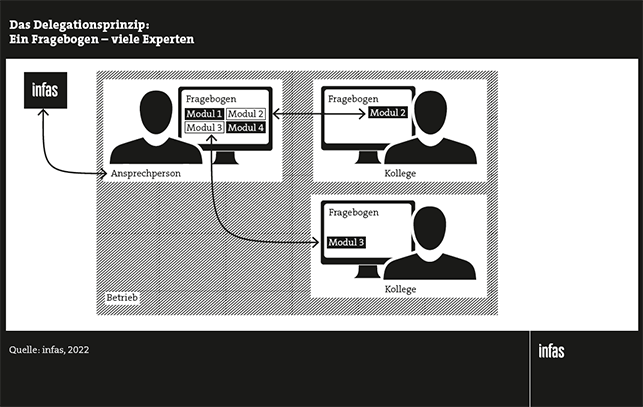Delegation for online surveys
Company or business surveys usually cover a wide range of different topics, for example on the consequences of the Corona pandemic, digitalization and employee training, or simply company data.
A respondent is then sought for the interview who can provide well-founded information on all the topics of the questionnaire, if possible. The more subject areas the company survey covers, the more detailed they are examined and the larger the company, the less likely it is that a single person will be able to answer all the questions equally well and reliably. It can then be useful to divide the task among several shoulders by having different experts from the company help answer the questionnaire. This is also how it is handled in many cases: For example, in the 2015 German Innovation Survey, around 29 percent of the paper questionnaires and 23 percent of the online interviews were answered by more than one person.
In the case of a survey using paper questionnaires, distribution among several respondents is relatively simple, with one person first answering all the questions from his or her topic areas and then passing the questionnaire on to answer the remaining questions in the company. It is irrelevant whether the first respondent leaves entire topic blocks or only individual questions in different blocks initially unanswered, since the unanswered questions in a paper questionnaire are easy for the next respondent(s) to identify.
In the case of a survey using a linear online questionnaire in which the questions are displayed in a fixed sequence, on the other hand, this is much more difficult for the companies to organize. The questionnaire can be interrupted by the respondent at any time and completed later after the missing information has been obtained – however, this completion can be very time-consuming if large parts of the questionnaire have to be gone through again in their entirety. The more colleagues are involved in answering the questionnaire, the more time-consuming it is to organize the answering of an online questionnaire in this way. This carries the risk that even if a company is actually willing to take part in the survey, a number of questions or even the entire questionnaire may remain unanswered. In addition, the quality of the answers suffers due to incorrectly entered or only roughly estimated inputs.

By using a so-called delegation function in the online questionnaire, these problems can be countered. In this process, a respondent can forward those parts of the questionnaire for which he or she does not have any information directly and in any order by e-mail to knowledgeable colleagues in the company. These colleagues can then access the questionnaire sections delegated to them and answer them independently. However, the responsibility for the delegation of questionnaire sections and the organization of their response remains at all times with the central respondent in the company.
infas is currently using such a delegation function in two ongoing projects: the German Innovation Survey 2022 (commissioned by the Leibniz Center for European Economic Research) and the study “Companies and Professional Working Environments in Germany” (commissioned by the German Institute for Economic Research in cooperation with the Helmut Schmidt University in Hamburg).
To use this function, which was originally developed by the Gesellschaft für Software in der Sozialforschung mbH (GESS), the questionnaires in both surveys were initially grouped into self-contained topic blocks. This is to keep the use of delegation as simple as possible for establishments by requiring that a particular block of questions within the establishment be forwarded to only one person, who can then answer all the questions in that block.
The navigation bar provides the respondent with an overview of the individual subject areas as well as their specific content. It can use this bar to directly access the different blocks and also the question pages within each block and answer them in any order. There you can also see how completely the question pages or blocks have already been processed.
The central respondent can then delegate one or more parts of the questionnaire to other experts in the company to answer (see figure on the left). In order to ensure the direct assignment of the survey to the central respondent, at least one topic block remains exempt from delegation. As an additional support for the respondents, the tool has an e-mail function integrated into the questionnaire, with which an invitation text previously defined by the questionnaire creator with an individual access link is transmitted to the responsible colleague. Alternatively, the respondent can display a generated access link and send it himself using any e-mail program or even a messenger.
As long as questionnaire parts are delegated, a call by the original respondent is not possible. However, she can end the delegation at any time in order to answer the topic block herself after all or to delegate it to another person. The contacted person has access to the delegated questionnaire part until a previously set deadline expires or the main contact ends the delegation.
Finally, the transmission of the final questionnaire to the survey institute is initiated by the central contact person. To prevent the respondent from prematurely initiating data transmission with delegated questionnaire sections still open, a corresponding error message can be included in the questionnaire.
Further application possibilities
The possible applications of the presented delegation function are manifold and not only limited to company or enterprise surveys. The delegation function can be used whenever it is desirable to have interview parts answered by persons other than the central contact person. Household studies in which several members of a household are interviewed about their personal situation are also such a use case. Here, the delegation function can be used to have the main contact person or head of household independently transmit the questionnaire sections addressed to other household members. It would also be conceivable to use the delegation function in a method mix of CATI and CAWI. The CATI interviewer would use it directly during the interview to assign questionnaire parts to other more knowledgeable people or – if the interview was interrupted – to invite the respondent himself to the downstream online interview. Furthermore, sensitive, confidential or optional question parts could be forwarded to the respondent during a CATI interview for subsequent processing in CAWI.
The delegation function thus offers the potential to make surveys of higher quality, more purposeful, and more convenient for respondents, thus increasing the quality of the data collected.
This article appeared in Lagemaß, issue 12. To the magazine
For further reading:
Photo by Priscilla Du Preez on Unsplash

